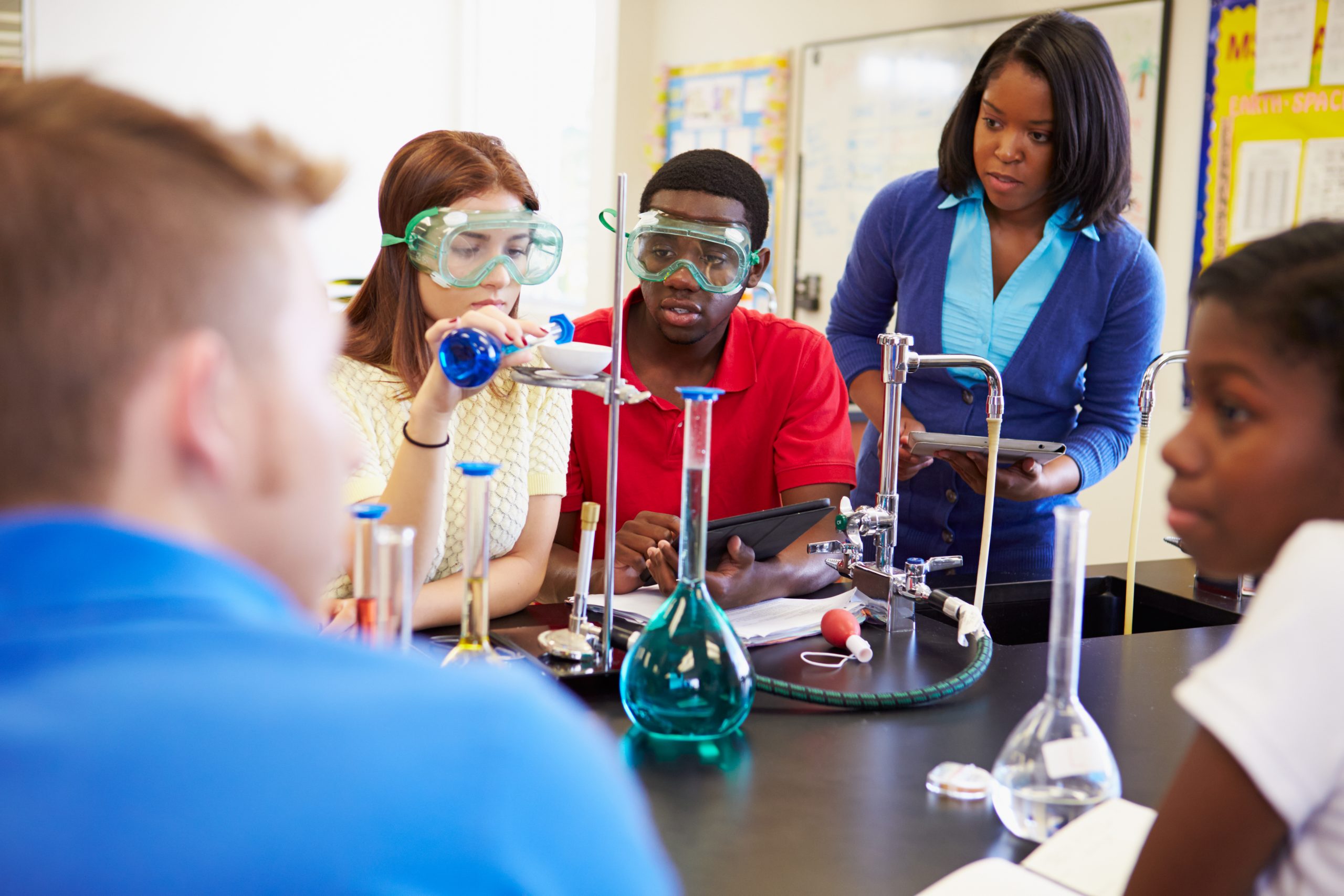With the different science GCSEs available, choosing the right one can feel daunting. If you want to gain a broad understanding of biology, chemistry, and physics, a GCSE in Combined Sciences is probably the best path for you.
If you already know which scientific discipline you’d like to pursue, then a single science GCSE, like chemistry, will give you the in-depth knowledge you need to succeed. Continue reading to learn more about each of these GCSE courses.
What Is GCSE Combined Sciences?
Also known as Double Science, undertaking a GCSE in Combined Sciences introduces students to all three science disciplines (biology, chemistry, and physics) and gives them two GCSEs that are based on their understanding of all three subjects.

GCSE Combined Sciences is the most popular science GCSE in the UK. It’s a great option if you’re unsure which scientific discipline you’d like to pursue at ‘A’ Level or university: Double Science typically covers around two thirds of the topics studied in triple science, allowing students to get a taste of many different areas.
Triple science, or single science, on the other hand, are more in-depth GCSEs well suited to students who want to gain a deeper knowledge of all three science disciplines.
What Is GCSE Chemistry Single Science?
If you want to pursue a career in chemistry-related disciplines, such as biochemistry or cosmetic chemistry, then you’ll need to take the GCSE in Chemistry Single Science. This course will develop your understanding of key topics in chemistry, and provides a more detailed curriculum than GCSE Combined Sciences. The topics that are covered in GCSE Chemistry Single Science are:
- Atomic structure and the periodic table of elements: How elements are arranged in the periodic table and how they correspond to their properties.
- Molecular bonding, structure, and properties of matter: Study different types of bonding, such covalent bonds, and learn how different types of bonds give rise to molecular structures, as well as how these concepts are applied in nanotechnology.
- Quantitative chemistry: Learn precise measurements and formulae that you can apply in the real-world as well as in work-related problem-solving. This will require a good grasp of mathematics. To get an idea about this type of exam, click here to visit the sample exam page.
- Energy changes in chemical reactions: Chemical reactions involve either the breaking up of bonds or the creation of bonds, or both. Energy is either released or absorbed in the process, making it either exothermic or endothermic reactions. This topic will give you a deeper understanding of how this process works.
- Chemical change and reactions: You’ll study the various types of reactions, such as acid-base reactions and metal reactions, and what the indicators of these are, like changes in colour or emissions of light. You’ll also learn how to perform various reactions, as well as titrations and electrolysis. Sample questions on this topic can be found here.
- Analytical chemistry: How to test and identify substances based on their properties and reactions. Analyses will involve precise measurements and the skillful use of various laboratory instruments.
- Organic chemistry: Learn about hydrocarbons, how to name them, as well as all the different structures and processes of synthesising products from hydrocarbons. Here are some examples of questions that you may encounter.

What Are The Differences Between Combined Sciences And GCSE Chemistry Single Science?
The difference between GCSE Combined Sciences and GCSE Chemistry Single Science is that the former is a broader look at all three science disciplines, while the latter takes a more in-depth approach toward a single discipline.
The GCSE Combined Sciences programme is also known as Triple Sciences because it includes the three core science subjects: physics, chemistry, and biology. Historically, when GCSEs were introduced in 1988, students had the option to choose among the three science subjects. However, there was a clear discrepancy between boys and girls in terms of choosing the subjects: boys tended to drop biology in favour of physics while girls tended to drop physics in favour of biology.
In response, the Association for Science Education called for a broader and more balanced science education for students up to 16 years old. This resulted in the creation of the Double Science Award, now called Combined Sciences, which merged the three science subjects into two GCSEs. The main objective of this new programme was to encourage students to pursue STEM careers.
GCSE Chemistry, on the other hand, is only focused on this single science subject, but is more in-depth. Combined Sciences is unable to achieve this level of detail because it would require too much time allocation for each curriculum. Therefore, GCSE Single Science in any of the three science subjects, offers a more specialised programme to students who want to pursue a specific discipline.
If you want to know more about the scope of the Chemistry Single Science GCSE, check out this GCSE chemistry revision and worksheets portal. You can also check the exam specifications here.

Should I Do Combined Or Single Sciences?
Deciding whether to choose the Combined Sciences GCSE programme or the GCSE Single Science programme will depend on your interest. If you already know which career path you want to take, you should focus on the most appropriate science. For instance, if you want to become a mechanical engineer, the best choice would be to focus on Physics Single Science. However, if you’re still unsure of your career path, choosing Combined Sciences will give you a broader perspective and allow you to test the waters.
Find out more about chemistry education in our chemistry education resources hub, or for more help and support on revising for GCSE chemistry, read our revision series:
- Chemistry GCSE Revision: Atomic Structure And The Periodic Table
- Chemistry GCSE Revision: Properties of Matter
- Chemistry GCSE Revision: Quantitative Chemistry
- Chemistry GCSE Revision: Energy Changes
- Chemistry GCSE Revision: The Rate and Extent of Chemical Change
- Chemistry GCSE Revision: Organic Chemistry
- Chemistry GCSE Revision: Chemical Analysis
- Chemistry GCSE Revision: Chemistry of the Atmosphere
- Chemistry GCSE Revision: Using Resources
- Chemistry GCSE Revision: Practical Skills











